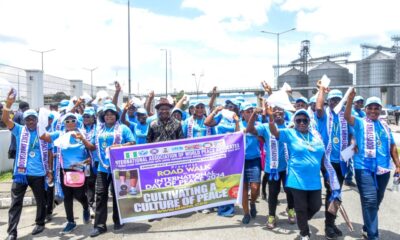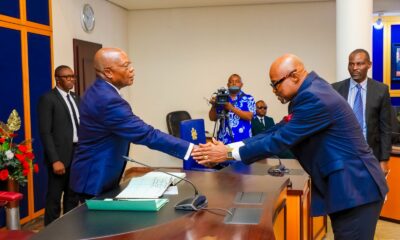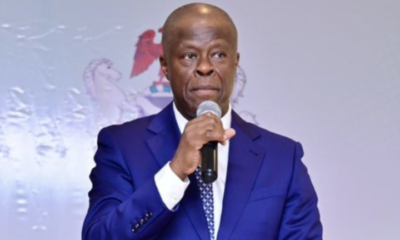Business
The inflation rate in Nigeria on an all-time high
Inflation is a rise in the price levels in relation to goods available leading to endless fall in an economy’s purchasing power over a period of time. It measures the proportion of the rate at which the normal price level of goods and services rise over time in an economy. Nigeria has been experiencing increased levels of inflation since the pandemic broke.
The world is currently fighting COVID-19 that has greatly affected many countries and the world at large, that has measures put in place to suppress the virus. Not only did these measures help curb the spread of the novel virus, but it has also reduced the performance of many economies, businesses and health systems of countries. Currently, more than 3,000,000 people got infected worldwide, with almost over 220,414 people dead. 44 people died in Nigeria from the virus with 255 recoveries. This has had a drastic effect on Nigeria’s economy, which saw its peak in March when the first case was recorded. In March, the CPI recorded a 0.84% rise in month-on-month inflation rate in Nigeria, which was a 0.5% increase from the previous month.
The inflation rate in Nigeria has continually been on an increase from month-on-month and year-on-year rates and several financial experts in Nigeria express their concerns about it and are calling for the currency’s stabilization. A majority of forex traders are particularly unaware about the state of the currency at a given period of time, especially beginners who rely on their brokers to update them on events plaguing the markets. The issues with FX broker comparison is that some brokers are more analytical than others when it comes to delivering information to their customers. While some brokers would prefer analyzing news before delivering it to a beginner trader, others just send out the news to their clients, without ensuring that the implications of the news are fully understood.
The average change in the percentage in both rural and urban areas in CPI of one year, ending in March 2020, over the CPI for the previous year till March 2019 was 11.62%. This shows a 0.08 increase rate of over 11.54% recorded in February 2020 for the same average.
In March 2020, the inflation rate in urban regions increased by 12.93% YoY; which was a 0.08 increase rate from 12.85% YoY change recorded in February 2020. With regards to the MoM rate, urban regions list increased by 0.88%, which is a 0.06 increase rate point from 0.82% recorded in earlier months.
This MoM development is generally caused by the prices of food to other consumer goods. Additionally, in March 2020, the inflation rate in the rural areas also increased by 0.03%, highlighting 11.64% from 11.61% in February 2020, which significantly contributed to the index prices of food. Simultaneously, there was a 0.80% increase in indices, at an additional 0.04 rate point from the 0.76% increase recorded earlier that month.
Statistics show that there was a rise in food prices that were brought about by an increase in costs of Potatoes, sweet potato, yams, fish, oils and fats, meat, fruits, bread and oats, and vegetables. There is currently volatility in the prices of all agricultural products, with the inflation rate steady at 9.98%, which is a 0.25% increase compared to the 9.73% recorded in March.
The highest inflation levels in Nigeria were recorded in bicycle prices, passenger transportation by sea and rates increased, medical services, medication, health services in general, and Major family equipment whether electronic or not. The most recent report suggests a quick rise in the prices of all products and services in the country, which was caused by the COVID-19 pandemic lockdown and the continuation of the pandemic. It is worth noting that the most recent inflation rate implies that the buying capacity of customers has decreased.
On Tuesday morning, Nigeria’s Consumer Prices Index, also known as inflation massively increased in August 2020, by 13.22% as per information delivered by the National Bureau of Statistics. This indicates the twelfth continuous rise since September 2019 and the most noteworthy in 28 months reported by a business examination shows that information from the NBS August 2020 expansion.
Business
Bank Supports Female Entrepreneurs With Grants
Kolomoni Microfinance Bank has awarded grants to five female entrepreneurs to boost their businesses as part of its commitment to promoting women in business.
The initiative, organized to mark International Women’s Day, was themed “Accelerate Her Growth.”
According to the bank, the decision to support women was inspired by World Bank data, which shows that 41 percent of Nigeria’s micro-businesses are owned by women.
Delivering the keynote address, business strategist, Ebun Akinwale, emphasized that entrepreneurship requires resilience, creativity, and passion.
She illustrated this by recounting her own business challenges and highlighting the critical role passion plays in overcoming obstacles.
The event underscored Kolomoni’s mission to empower women and support small businesses in Nigeria.
Other speakers at the occasion were Odunayo Oyebolu, a seasoned entrepreneur; Victori Ajiboye, a marketing strategist with global experience; and Simi Ojumu, a finance expert.
The beneficiaries said the financial support was a validation of their hard work and a boost of confidence towards scaling through in their businesses.
The winners were selected after sharing their entrepreneurial journeys and presenting business proposals for financial assistance from the bank.
Business
Nigerian SME Awards: Providus, Access, Others Compete For Honor
The 8th edition of the Nigeria Small and Medium Enterprises (SMEs) Summit and Awards (Nigeria SMEAwards) is set to take place in Lagos for the first time in its history, marking a significant milestone for this prestigious event.
Endorsed by the Small and Medium Enterprises Development Agency of Nigeria (SMEDAN), the annual awards celebrate the entrepreneurial spirit driving Nigeria’s economy.
The visionary convener of NigeriaSMEAwards 2025, Adedayo Olalekan, said, “Governors from Zamfara, Sokoto, Ebonyi, Borno, Enugu, Ekiti, Benue, and Kaduna States have all implemented transformative initiatives that have greatly benefitted local enterprises.
“Their contributions will serve as a beacon of inspiration for the nation.”
Speaking at a recent press conference in Lagos, Olalekan emphasised that the event would introduce a fresh and unique approach, moving away from tradition.
“Despite economic challenges, Nigerians continue to show an unwavering commitment to progress”, he said.
He noted that the awards will not only honor outstanding individuals, but also recognise the critical role state governments play in nurturing vibrant SMEs.
“State governments have been instrumental in fostering a supportive environment for SMEs, which in turn benefits both the awardees and the larger economy.
“With major banks like Providus, Access, and First Banks competing for top honors, the 8th NigeriaSMEAwards promises to be a night of celebration, recognising exceptional contributions to Nigeria’s SME landscape”, Olalekan added.
Amid global challenges such as inflation, geopolitical instability, and the ongoing conflict in Ukraine, Nigerians continue to show remarkable resilience.
Their efforts, according to reports, have contributed to job creation, economic growth, and overall prosperity, with SMEs at the forefront of this success.
This year’s awards will recognise governors who have made significant strides in advancing the SME sector within their states.
Business
SMEs Experts Urge MSMEs To Remain Focused
Small and Medium Enterprises (SMEs) consultants in Rivers State have called on entrepreneurs to be focused and avoid distractions.
The experts, who were speaking on the recent developments about the change of leadership in the state, said entrepreneurs need to put more efforts in their businesses in order to break even in the present situation in Rivers State.
Speaking in a chat with The Tide, an international SMEs consultant, Amb. Larry Goodwill Ajiola, said the political moves is capable of distracting SMEs who are not grounded in their businesses, adding that “the serious minded business men and women would utilise the opportunity to increase their revenues”.
Amb Ajiola, who is the President and Chief Executive Officer (CEO) of Rumuomasi Co-operative and Credit Society Limited, Port Harcourt, said, “Rugged entrepreneurs look out for business opportunities in situations around them, whether good or bad”.
He reiterated that the loan facility given to 3,000 SMEs in the state revived and expanded businesses, adding that the empowered businesses should continue to push, no matter the situation.
“credit is a powerful tool for achieving financial security.
“We can only keep imagin the economic value that the over 3,000 MSMEs would add to the positive economic dynamics of Rivers State and the Local Government Areas in terms of Gross Domestic Prooduct (GDP), increased tax returns, employment creation, income distribution, and production of goods and services”, he said.
Another SMEs Expert, a business consultant and SMEs trainer, Mr. Chisom Sam-Orji, in his advice, noted that every SME in the state should realize that change is the only constant thing.
He said SMEs should also know that “tough times never last, but tough people do”, adding the need for every entrepreneur to stay focused on creating value and remain resilient.
“This is not the time to be distracted by every noise around your space, but to maximize every time you have to focus on the essentials and keep creating value.
“For some people, it may just be the time to diversify, create new products and services to serve a new or existing market. But this must be based on the facts available to you via research and market surveys”, he said.
The SMEs expert also said the present time in the life of an entrepreneur is a time to cut off unnecessary excesses that surround one’s business.
“Those extra costs that may hamper your growth in this season and beyond, and focus on just essentials.
“SMEs should find certain leverages that are available to aid their business growth. This could be in form of grants, knowledge, and other leverage tools.
“Collaboration is one big way to grow in this season. Finding ways to collaborate with like minds instead of competing could enable a product or service gain advantage in the market and beyond.
“They should also find ways to sustain and grow their customer relationship as this is key to sustaining business flow. They must seek new and efficient ways to serve their customers and gain their loyalty”, he stated.
He further called on every entrepreneur to keep building capacity and never take their eyes off their visions, adding the need to muster every courage it takes to keep building and moving forward.
Lilian Peters
-
Nation2 days ago
Military Committed To Supporting Sustainable Food Security In Nigeria – CDS
-

 News2 days ago
News2 days agoRivers HoS Resigns As Ibas Appoints New SSG
-
Politics2 days ago
Anyaoku, Yakasai, Osoba, Agbakoba, Others To Meet NASS Over New Constitution
-

 Featured2 days ago
Featured2 days agoBring Your Wealth Of Experience To Governance, Ibas Tasks New SSG
-
Business2 days ago
Nigerian SME Awards: Providus, Access, Others Compete For Honor
-
Nation2 days ago
South East Caucus Kicks As Senate Rejects Nwosu’s Immortalisation
-

 News2 days ago
News2 days agoNigeria’s Economy Achieving Stability – Edun
-
Business2 days ago
Stakeholders Task Govt On Efficient Rail Transport In Nigeria

